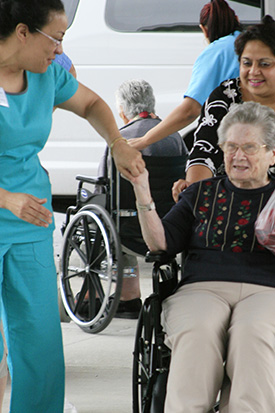Reprinted from A Place For Mom
The opioid abuse epidemic in America is only now getting the media attention that it warrants, but it has been a growing issue for decades. According to the National Institute on Drug Abuse (NIDA), there are an estimated 2.1 million people in the  United States suffering from substance-use disorders related to prescription opioid pain relievers.
United States suffering from substance-use disorders related to prescription opioid pain relievers.
Learn more about the opioid epidemic among seniors.
Opioid Drugs Have a Stranglehold on Seniors Too
Since 1999, the number of deaths attributed to opioid abuse has quadrupled, and “there is also growing evidence to suggest a relationship between increased non-medical use of opioid analgesics and heroin abuse,” according to NIDA, which is why the number of heroin addicts has increased to 467,000 in the United States.
Still, most of the media coverage of the epidemic focuses on younger people. Meanwhile, opioid abuse among seniors remains an underreported, dangerous and shockingly pervasive phenomenon.
44% of Opioid Overdose Deaths Are in Patients Aged 45 to 64
A study conducted by Medicare found that about 15% of Medicare recipients were prescribed opioid-based medication after visiting the hospital, and about 43% of that group continued to take the medication three months after it was first prescribed.
The number of seniors hospitalized for opioid overdoses has increased five-fold over the last 20 years. According to the Centers for Disease Control and Prevention, 44% of all opioid overdose deaths in 2013 and 2014 occurred in patients between the age of 45 to 64.
Why Seniors?
Often seniors can find themselves addicted despite following doctors’ instructions to the letter. But why is this?
It is no secret that as you age, you face greater risk of illness and injury. Seniors are more susceptible to injuries that require pain management, such as broken bones and chronic pain.
Unfortunately, there are not many good options for treating pain in seniors. Even seemingly benign drugs like ibuprofen or Advil can lead to serious bleeding, while being far less effective at treating pain than opioid or synthetic opioid painkillers.
In 2009, the American Geriatric Society (AGS) came out in favor of prescribing opioids, asking doctors to consider opioids for any senior with moderate or severe pain. They based this decision on controversial findings that suggested seniors were less likely to become addicted to opioids than other patients. This conclusion, however, is not accepted by all.
Dr. Mel Pohl, a notable critic of the AGS recommendation, was quoted by National Public Radio as condemning the idea as a “horrible misconception” suggesting that “there’s no factual, scientific basis” for the study. Pohl argued that “opioid drugs take over the brain. It doesn’t matter how old the brain is.”
The AGS guidelines are no longer being implemented, but many doctors continue to prescribe opioids more liberally to seniors than younger patients. They argue that they don’t want to see their patients in pain, and that seniors are less likely to develop dangerous habits associated with opioid abuse.
Opioids Pose Additional Risks to Seniors
In addition to the risk of overdose or dependence that is always associated with opioids, seniors also face many age-associated risks. When on opioids seniors are, according to the Wall Street Journal, “especially vulnerable to falls, fractures and respiratory arrest when using prescription narcotics – and often they are taking other medications that magnify the risks.”
One study found that 16.5% of all opioid-related fatalities occur despite the patient taking the recommended doses, as per the instructions given by their doctor and pharmacist.
How to Protect Against Opioid Addiction or Overdose
The Center for Disease Control (CDC) has begun to urge doctors to opt for short-term, fast-acting medications, instead of long-lasting drugs prescribed for a longer period. But anyone prescribed an opioid should still take precautions.
If you or a senior you know are taking an opioid, encourage your doctor to prescribe the lowest necessary dose, and look into alternative options to address pain, such as non-opioid medications. Never exceed the recommended dose, follow the instructions given to you by your doctor and don’t take your prescription with alcohol.
Most importantly, listen to your body. If you feel that you are being over-prescribed pain medication or are dependent on your pain medication, then speak to your doctor immediately.

